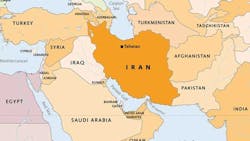US Lifts Ban on Sales of Computers, Communications Equipment to Iranians
WASHINGTON - The United States on Thursday lifted a ban on sales of communications equipment to Iranians and opened access to Internet services and social media, in a bid to help the Iranian people avoid government controls.
The decision immediately allowed U.S. companies to begin selling computers, tablets, mobile phones, software, satellite receivers and other equipment for personal use to Iranians, after such sales had been banned under sweeping sanctions on the country.
Also allowed were the sales and free provision of Internet communications like instant messaging, chat and email, social networking, sharing of photos and movies, web browsing and blogging.
State Department spokeswoman Jen Psaki said the action would allow Iranians to skirt the government's "attempts to silence its people" and help them exercise "the right to freedom of expression."
U.S. vendors will be able to "provide the Iranian people with safer, more sophisticated personal communications equipment to communicate with each other and with the outside world," she said in a statement.
The U.S. Treasury issued a general license allowing the sales of personal communications equipment and services by Americans, banned until now under sanctions aimed at pressuring Tehran over its nuclear program.
Iranian Government Ban Maintained
But a ban remained in place on selling to the Iranian government or any entity or individual specifically designated for U.S. sanctions.
"Freedom of speech, assembly and expression are universal human rights," said Treasury Under Secretary for Terrorism and Financial Intelligence David Cohen.
"We will use all the tools at our disposal, including licenses that facilitate communication and designations to target those responsible for human rights abuses, to help the Iranian people exercise these basic rights."
The Treasury also put sanctions on Asghar Mir-Hejazi, the deputy chief of staff for Iranian Supreme Leader Ali Khameini, and on the government censor, the Committee to Determine Instances of Criminal Content, for "contributing to serious human rights abuses... including through the use of communications technology to silence and intimidate the Iranian people."
With the creation of the CDICC, the Treasury said, Iran's Internet filtering censorship "has become more systematic and uniform," aiming at information the government "deems against the regime's national beliefs and safety."
It called Mir-Hejazi "the working brain behind the scenes of important events," including directing oppressive government acts following the June 2009 post-election unrest.
In addition, the State Department announced it had placed visa restrictions on nearly 60 Iranians, mainly from the government, for their "role in the ongoing repression of students, human rights defenders, lawyers, artists" and others.
Copyright Agence France-Presse, 2013
About the Author
Agence France-Presse
Copyright Agence France-Presse, 2002-2025. AFP text, photos, graphics and logos shall not be reproduced, published, broadcast, rewritten for broadcast or publication or redistributed directly or indirectly in any medium. AFP shall not be held liable for any delays, inaccuracies, errors or omissions in any AFP content, or for any actions taken in consequence.
